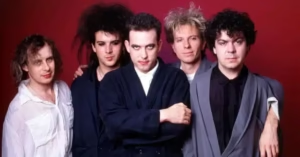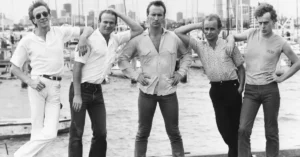Modest Mouse: The Pioneers of Indie Rock’s Quirky Soul
Introduction
Emerging from the Pacific Northwest in the early 1990s, Modest Mouse has become one of the most enduring and innovative bands in the indie rock scene. Known for their off-kilter rhythms, poetic lyrics, and a sound that blends raw energy with introspective melancholy, Modest Mouse carved a unique niche that has influenced countless artists. Led by the enigmatic frontman Isaac Brock, the band’s journey from small-town obscurity to mainstream acclaim is a testament to their relentless creativity and distinct voice.
Modest Mouse. Formation and Early Years
Modest Mouse was formed in 1993 in Issaquah, Washington, by Isaac Brock (vocals, guitar), Eric Judy (bass), and Jeremiah Green (drums). Their early sound was a mixture of punk energy and experimental rock textures, with Brock’s unique vocal delivery and cryptic, philosophical lyrics setting them apart. The band’s name itself reflects their understated and self-effacing approach to music, inspired by a passage from Virginia Woolf’s novel The Mark on the Wall.
Their debut album, This Is a Long Drive for Someone with Nothing to Think About (1996), showcased sprawling, lo-fi indie rock anthems filled with a restless spirit and evocative storytelling. Though it didn’t achieve commercial success, the album gained a cult following and established the band’s reputation for crafting emotionally rich music with a sense of urgency.
The Lonesome Crowded West (1997): Breakthrough and Critical Acclaim
The follow-up album, The Lonesome Crowded West, is widely regarded as a masterpiece of 1990s indie rock. It combined raw, gritty instrumentation with bleak yet poetic reflections on suburban sprawl, loneliness, and existential dread. Tracks like “Doin’ the Cockroach,” “Trailer Trash,” and “Teeth Like God’s Shoeshine” illustrated the band’s ability to paint vivid portraits of American life’s alienation.
This album cemented Modest Mouse’s reputation as a band that could merge indie rock’s DIY ethos with grand thematic ambitions. The record’s sprawling, sometimes abrasive soundscapes and Isaac Brock’s distinctive voice made it a touchstone for many indie artists who followed.
Modest Mouse. Evolution and Experimentation
Modest Mouse continued to evolve throughout the late 1990s and early 2000s. Their third album, The Moon & Antarctica (2000), marked a significant shift towards more atmospheric and textured arrangements, thanks to collaborations with producer Brian Deck. The album received critical acclaim for its expansive sound and contemplative themes, including tracks like “Gravity Rides Everything” and “3rd Planet.”
Despite critical praise, Modest Mouse remained largely an underground band, building a dedicated fan base through relentless touring and consistent releases.
Mainstream Success with Good News for People Who Love Bad News (2004)
The band’s fourth album, Good News for People Who Love Bad News, catapulted them into the mainstream spotlight. With hits like “Float On”, “Ocean Breathes Salty”, and “The World at Large”, Modest Mouse combined their trademark quirky, introspective songwriting with a more polished and accessible sound.
“Float On,” in particular, became an anthem of resilience and optimism amid adversity, earning extensive radio play and MTV rotation. The album earned two Grammy nominations and significantly expanded the band’s audience, proving that indie rock could achieve commercial success without sacrificing artistic integrity.
Modest Mouse. Continued Innovation and Lineup Changes
Following their breakthrough, Modest Mouse’s lineup underwent several changes. Bassist Eric Judy departed in 2012, but Isaac Brock and Jeremiah Green remained constants. The band’s sound also diversified, incorporating elements of folk, electronic music, and even hip-hop beats.
Their 2007 album We Were Dead Before the Ship Even Sank featured guitarist Johnny Marr, formerly of The Smiths, adding a new layer of melodic complexity to their sound. Songs like “Dashboard” and “Missed the Boat” demonstrated the band’s ongoing willingness to experiment while maintaining their core identity.
Modest Mouse. Later Albums and Legacy
Modest Mouse released Strangers to Ourselves in 2015, their first album in eight years. It continued their tradition of exploring themes of alienation, consumerism, and human connection, wrapped in lush, layered production. Tracks such as “Lampshades on Fire” and “The Ground Walks, with Time in a Box” showcased the band’s signature mix of catchy hooks and existential musings.
Over three decades, Modest Mouse’s music has remained emotionally honest and sonically adventurous. They have influenced a wide range of artists, from indie rock peers to mainstream alternative acts.
Modest Mouse. Themes and Style
Modest Mouse is known for their complex and often abstract lyrics, which touch on themes like existential anxiety, the human condition, the absurdity of life, and nature’s power. Isaac Brock’s poetic storytelling blends humor with melancholy, creating a distinctive voice in alternative music.
Musically, the band mixes unconventional song structures, odd time signatures, and a mix of distorted guitars and melodic hooks. Their live performances are known for their intensity and emotional depth.
Conclusion
Modest Mouse stands as a pillar of indie rock’s evolution, blending introspective lyricism with inventive music that defies easy categorization. From their gritty beginnings to chart-topping hits, they have maintained artistic integrity while reaching a broad audience. Their influence on indie and alternative music continues to be profound, making them one of the most important bands of their generation.





